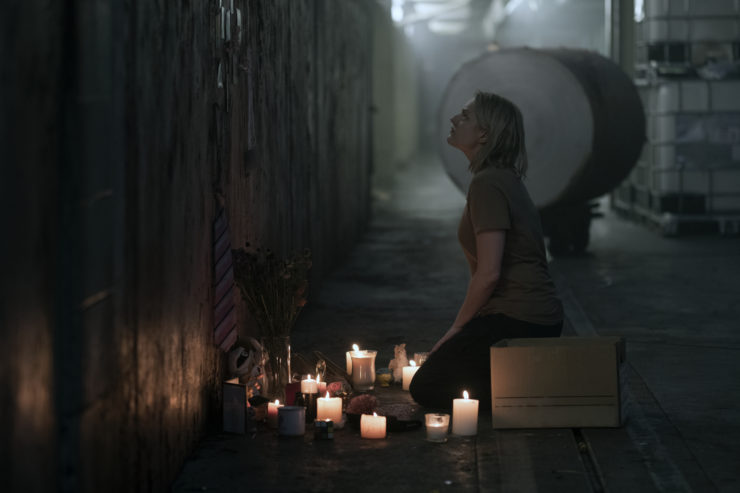Margaret Atwood’s novel The Handmaid’s Tale ends on a note of ambiguity: Offred steps into the Eyes’ car, “into the darkness, within; or else the light.” This open-ended farewell from the Handmaid narrator leaves readers to draw their own conclusions about Offred’s fate, either optimistic or pessimistic, hopeful or bleak.
There’s never the option of the shadows. The in-between, the liminal space between captivity and freedom. Purgatory. Finishing the book, we imagine that Offred finally gets out of Gilead, whether that’s smuggled out in a car or in a noose on the Wall. But as the television series, starting its second season entirely off-book, reminds us, Gilead is always within you.
Spoilers for The Handmaid’s Tale 2×01 “June” and 2×02 “Unwomen”
How is it possible that The Handmaid’s Tale got even bleaker? Looking back through last season’s reviews, I completely forgot how the Offred in the pilot had a snarky running monologue, a way of holding on to her voice as June even as she uttered the same banal lines and performed the same mechanical movements as every other Handmaid. Now, she’s more June than we’ve ever seen her, but that spark is guttering.
If I had to hazard a guess, it’s because of the stops and false starts that characterize the first two episodes. Offred’s act of rebellion at the stoning gets her and the other Handmaids carted to the gallows in Fenway Park, only for the hanging to be an elaborate mindfuck. The other Handmaids are punished in the rain while Offred, her pregnancy revealed, gets blankets and soup. She escapes for a second time into a getaway car arranged by Nick, only to wind up still within Gilead’s borders, still a prisoner of the dystopian state. June may have regained her voice, but she’s told to keep quiet as she hides from the Eyes sweeping Gilead for her. It’s a half-existence, passing through a dingy warehouse and then the abandoned offices of the Boston Globe, waiting to be spirited to her next stop on Mayday’s Underground Femaleroad. This emotional whiplash of hope and despair, of facing certain death one moment and then being returned to stark reality of imprisonment, is in many ways more exhausting than Gilead’s previous methods of subjugation.
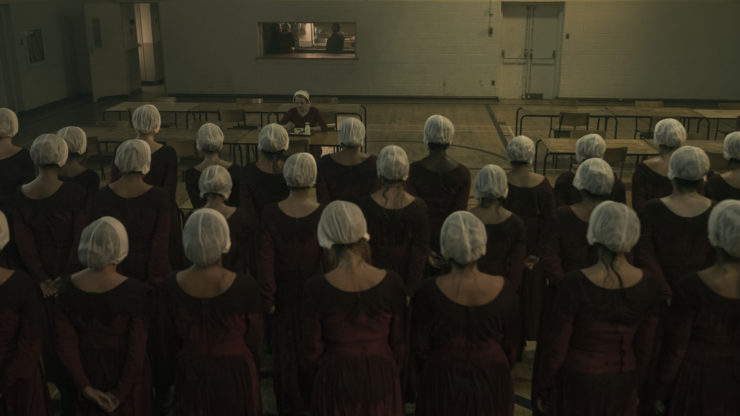
It’s also incredibly lonely. After a season of solidarity among Handmaids, of hands clasped under cloaks and subtext edging every utterance of “Praised be,” June is solitary. She’s set apart—first, by her elevated status as carrying blessed fruit, suddenly precious and to be protected at all costs. Parading the sodden Handmaids in front of her and then burning them while Offred stonily sips her soup effectively closes the ranks.
How can she expect anyone to follow her when she won’t bear the consequences of her rebellion?
Then, she’s spirited away in broad daylight following a doctor’s appointment, with no way to leave a message for anyone—not another Handmaid, nor Rita, who as far as we know (as far as we hope) still has the sheaf of Handmaids’ tales. Season 1 culminated in this collection of harrowing accounts from hundreds of Handmaids across Gilead—strength in numbers, supposedly—and yet the woman who Mayday entrusted with the package was forced to pass it on out of desperation. Another hope, potentially dashed, and the Handmaid who knows of its existence is nowhere to be found.
How can June lead anyone when she’s hiding in the shadows?
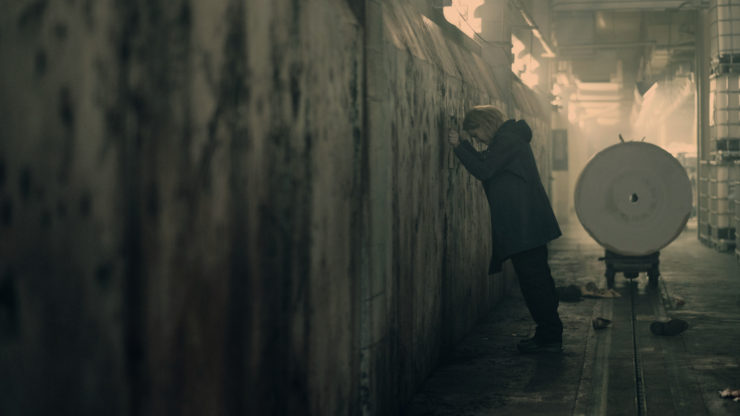
These stops and starts made it difficult for me to fully appreciate the gravity of June’s actions at the end of the first episode: stripping off her Handmaid clothes, burning them, cutting her hair and throwing that in the fire, and, finally, cutting out her ear tag. She recites her name, her age, her height and weight, her status as a pregnant woman, and concludes with, “I am… free.” The striking visual, of June in her undergarments drenched in blood down her left side, was prominent in the season 2 trailers; I had assumed that she had killed the Commander or someone else, wrung her freedom out of a captor’s life. Instead, she has effectively killed Offred, gouged the Handmaid out of her.
Yet something about this moment rang false to me—what should have been a bigger step was undercut by the realization that even if she were no longer Offred, she still hasn’t escaped Gilead within her. It might be just me, but for a brief moment I expected that she might kill her fetus; after all, if the Eyes are searching for a pregnant Handmaid, what’s the most brutally effective disguise than to not be with child? But, I imagine June thought, this was a life conceived with some measure of love or at least hope, not from the dehumanizing Ceremony but through real connection. Still, it will make fleeing more difficult as the weeks and months go on.
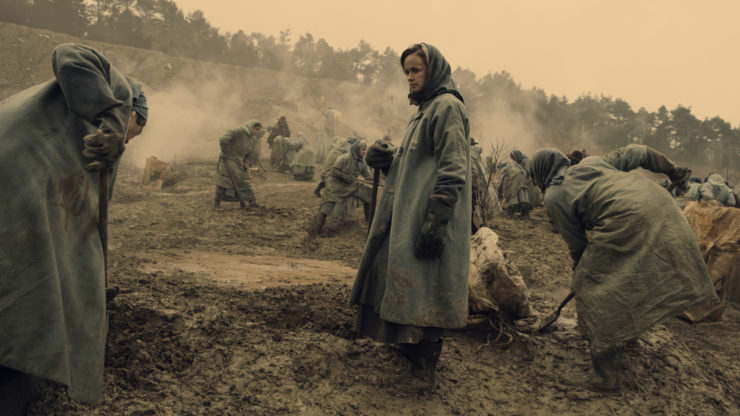
“Gilead is within you. Like the Lord’s love. Or the Commander’s cock. Or cancer.”
This season seems to be about the inability to escape what’s inside you, whether or not you want to. June’s pregnancy. Emily’s queerness, which makes her a target at her university, in the first flashbacks we’ve seen to her previous life. And, in the present, her cold fury.
While June waits for her next step, Emily knows hers. It’s the same, unending fate: backbreaking labor in the Colonies, unless the pollution and possible radiation kill her and the other “unwomen” first. Then in comes the next batch of unwomen—including a Wife, played by Marisa Tomei. One would expect it would take nothing less than harming a Handmaid to get a Wife branded an unwomen, but it turns out all it takes is a tawdry affair. “I fell in love,” she dreamily tells Emily, the only sympathetic ear in a camp of former Handmaids. “Do you think that matters?”
This Wife—I don’t even remember if we’re given her name—is more earnestly pious than the pragmatic Serena Joy, and believes that she has been shown mercy by being moved to the Colonies, and especially in the form of Emily, with her antibiotics and murmured explanation of “A mistress was kind to me, once.” I even believed it! I briefly wondered if Emily and the Wife might have a forbidden love affair out in the Colonies, where all of these women are stripped of their roles and reduced to the same level.
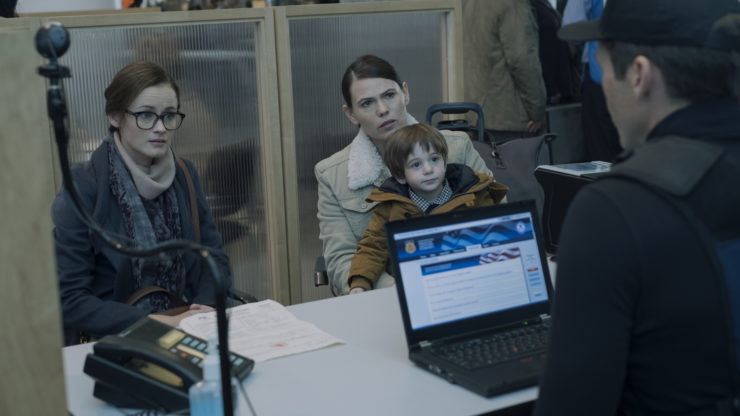
Except that they can never fully get away from the spots they inhabited in Gilead’s hierarchy. The Wife should have realized this, but instead she ends her life sprawled on a dirty bathroom floor, Emily hovering over her with those big, cold eyes: “Every month, you held a woman down while your husband raped her. Some things can’t be forgiven.”
Even if this Wife didn’t play the same role Serena Joy did in helping the Sons of Jacob seize control of everything from the Capitol to universities like Emily’s, she was part of the cancer that slowly, insidiously infected these women’s lives. The social worker interrogating June at the hospital about Hannah’s fever and putting aside work for her child’s well-being. The people who spray-painted “FAGGOT” beneath the hanging body of Emily’s boss, also queer. The ICE officer challenging Emily’s motherhood, her marriage, her right to board a plane with her wife and son.
It’s important that the pre-Gilead flashbacks continue in season 2; if anything, they’re even more affecting because we’re starting to see where things turned. Season 1 depicted the part of the book that has most stuck with me, the day that June and every other woman was locked out of her bank account, but that’s a gamechanger kind of moment. What we’ve glimpsed in these two episodes is the slow infiltration of the Sons of Jacob into daily life, turning the status quo into something supposedly illegal. Not even infiltrating—many of them were already there, waiting.
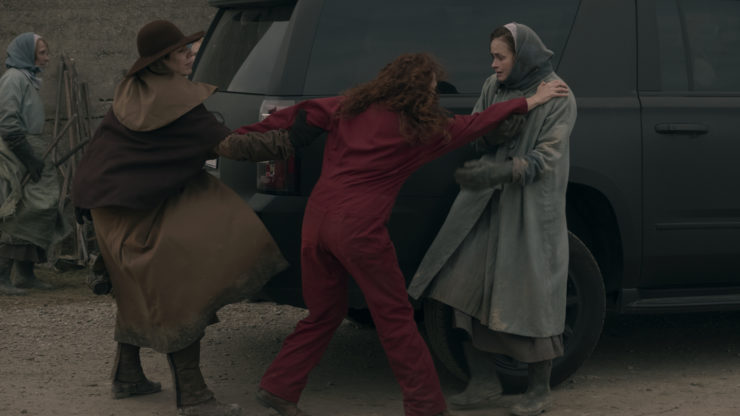
Will hope be the same? Something always inside that slowly makes its way out in small gestures and little moments? Right after Emily has strung up the dead Wife as a gesture to the rest of the Colony, another bus brings in the next round of unwomen—including former Handmaid Janine. While Emily was never going to level with the Wife, here she suddenly has an ally.
Cut off from the other Handmaids, June is at first obsessed with escaping to Canada—not just to find Luke, but to flee the ghosts of the Boston Globe offices, the people felled by the nooses hung from the rafters and the bullet holes pockmarking the walls. But because she is forced to wait in what she calls a slaughterhouse, June opens herself up to those ghosts—transforming the wall into a memorial, wedging photos into the holes, retrieving a woman’s shoes, lighting candles, and praying. She dredges up the small spark of hope inside her and brings it out of her.
Maybe that’s the way out of the shadows.
Scraps
- Watching these episodes, I couldn’t stop thinking about the line from Mad Max: Fury Road, which happens to be the title of the first episode of the AI thriller podcast Sandra: “Hope is a mistake.”
- I knew they couldn’t hang Offred in the opening scene, not unless this season was going to resemble “An Occurrence at Owl Creek Bridge.” But the throwing of the lever and the fake-out were still shocking in a pit-of-the-stomach way.
- Then, that great wide shot of a figure stepping onto the field with her microphone, and my notes just say FUCKIN AUNT LYDIA.
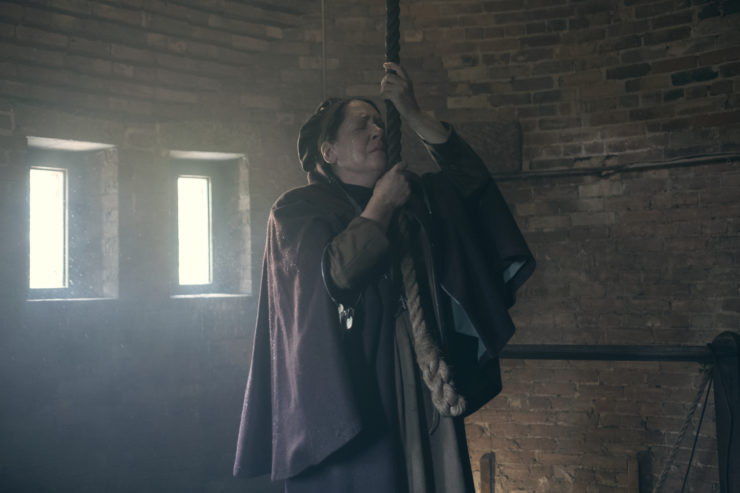
- An especially gutting moment in the flashbacks, which mirrored the present, was June caught between wanting to watch the news with Luke following the terrorist attack on Washington, DC, and Hannah begging her to stay with her. Comforting her daughter, she is cut off from the latest news. Pregnant, she is cut off from the rebellion.
- The overhead shot of Offred in the doctor’s office, with Fred and Serena Joy standing over her, reminded me uncomfortably of the Ceremony.
- Just when you think Gilead can’t get even crueler, we meet poor, chained Ofwyatt. Oof.
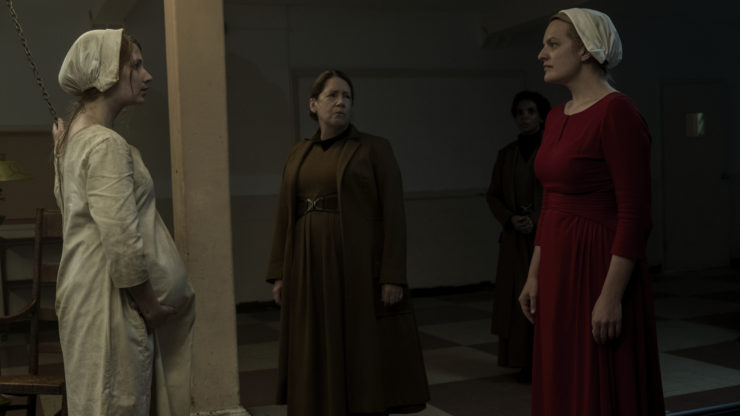
- I have to imagine we’ll see more of Emily’s wife Sylvia since it’s Clea DuVall, but then again, Marisa Tomei only made it one episode. Talk about stunt casting!
- My wishlist for season 2 mirrors a lot of the comments from the season 1 finale post: I want the story to expand to characters like Hannah, and maybe even Emily’s son Oliver—children being raised in Gilead. We haven’t gotten anything of Canada, but the next episode focuses on Moira, so yay!
Natalie Zutter was initially upset that she didn’t love these two episodes more, but writing this review has her more hopeful for the rest of season 2. Talk The Handmaid’s Tale with her on Twitter!










